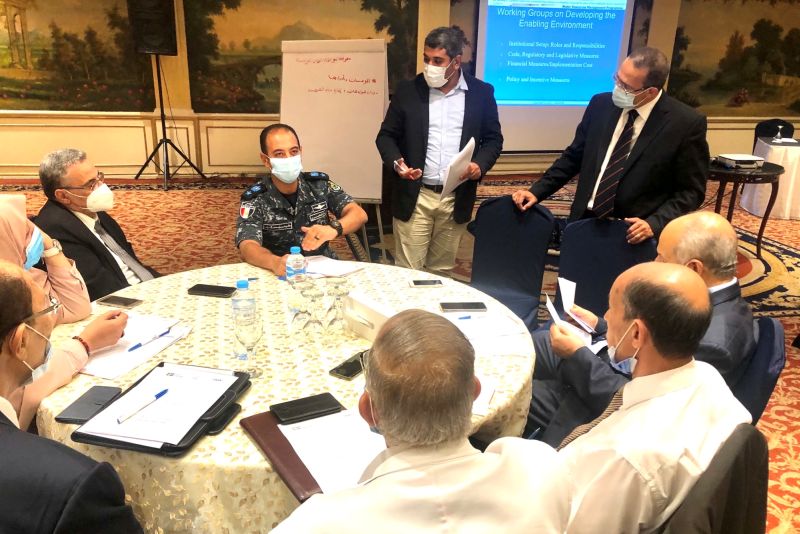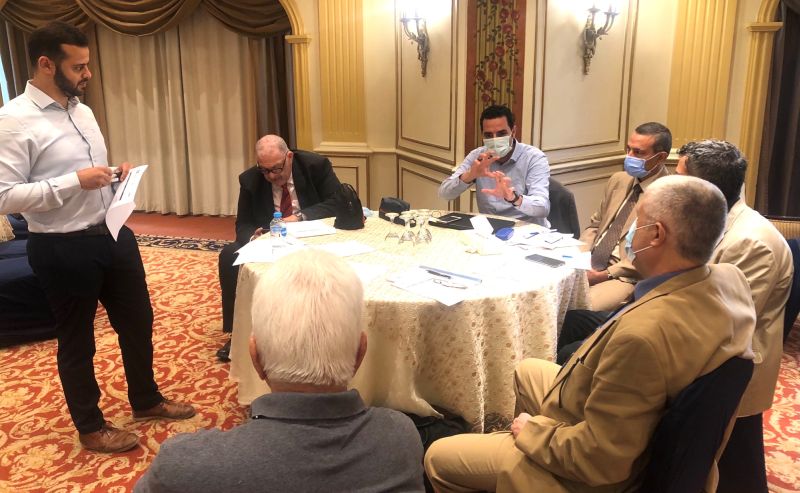Consultation on Egypt 2030 Shared Water Reuse Strategy at the 5th National Learning Alliance (NLA) Dialogue

On July 28, 2021, ReWater MENA project organized the 5th National Learning Alliance (NLA) Consultation Dialogue on “Egypt 2030 Shared Water Reuse Strategy”, in partnership with the Center for Environment and Development for the Arab Region and Europe (CEDARE), which represents the fifth in a series of six national dialogues over the past two years. The NLA Dialogue aims to agree on the main outlines and elements of the strategy.
The meeting was attended by key stakeholders and representatives from the Ministry of Housing, Ministry of Agriculture and Land Resources, the Holding Company for Water and Wastewater, Egyptian Water and Wastewater Regulatory Agency (EWRA), the Armed Forces Engineering Authority, water user’s association, agricultural associations, representatives of agricultural investors, the private sector, civil society, many experts, consultants, representatives of universities, research bodies and regional and international organizations.
The NLA Dialogue was inaugurated by Dr. Khaled AbuZeid, Regional Director of Water Resources at the Center for Environment and Development for the Arab Region and Europe (CEDARE), pointing out that the aim of the meeting which is to consult on preparing Egypt 2030 Shared Water Reuse Strategy. This comes after the 4th NLA Dialogue which validated the 2030 national and local water reuse targets in the presence of the members of the National Learning Alliance and the Steering Committee.
Dr. Alaa El-Bably, Director of the Soil, Water and Environment Research Institute at the Agricultural Research Center, representing the Ministry of Agriculture and Land Reclamation, discussed the main targets of the Ministry of Agriculture’s Strategy for Sustainable Development in 2030. He also pointed out that due to the limited quantities of fresh water available, in addition to the shortage in other water resources, the Ministry of Agriculture and Land Reclamation considers the reuse of water for irrigation and land reclamation inevitable to maximize agricultural production to meet the increasing demand for food. Therefore, the Ministry of Agriculture and Land Reclamation is currently preparing plans for land uses and investments for the New Delta region, which depends on water reuse as a source of irrigation water and the preparation of crop structures appropriate for that type of land and water and to provide opportunities for optimal use of natural resources in such new areas.

Over the past few decades, the Ministry of Agriculture and Land Reclamation had introduced a number of activities, strategies and plans in several areas related to the safe water reuse for agriculture. With the increasing demand for agricultural products, farmers are looking for non-conventional water sources. It is an attractive option, especially when traditional water resources are scarce, as is the case in Egypt. However, if water reuse is used in agriculture without taking the necessary safety and security precautions, microbiological and chemical pollutants can accumulate in crops, animal products, soil and in water resources, leading to health effects. If water is treated in an appropriate way and used in a safe way, it becomes an important and valuable source of water and nutrients and it contributes to achieving food security and improving livelihoods. Hence the importance of the project for the safe water reuse and the preparation of a national strategy for water reuse in a safe manner.
Dr. Amgad El-Mahdi, Head of IWMI MENA Office, welcomed the participants. He noted that the ReWater MENA project is supporting the most water-deficient region in the world, and also noted that the gap between needs and water resources is widening every day as a result of climatic factors, increased population, water demand and many other factors, and said that we have untapped resources increasing every day: wastewater that is consumed and collected from residential areas, and considers safe use of treated and reused water as a promising solution to fill the gap deficits between resource needs.
He also noted that this project aims to develop enabling environment to implement sustainable models for water reuse in the region and works on four main outputs: the first output, which is the development of a reference book and some illustrative examples of safe water reuse in the region. The second output is the development of strategic plans for water reuse and the appropriate enabling environment for each partner country. The third output is the development of national strategies for the three partner countries a regional strategy for water reuse. The fourth output is to strengthen the capabilities of all beneficiaries through training in the countries of the region.
He pointed out that each drop of safe reuse of water will lead to revitalizing the agricultural sector in the region, especially Egypt. Water reuse will bring significant social, economic and environmental benefits and this will help sustainable development and help achieve water and food security.
Dr. AbuZeid presented the general framework of the strategy, which is consulted on all its main items and key frameworks used, including a summary of national strategies and plans, the basic water balance for the reuse of water, the development of national and local targets, the challenges facing implementation, and the agree on the strategy statement.
Consultations were held to discuss the elements of enabling environment of the strategy. The participants were divided into 4 working groups to consult on the following key elements to develop an enabling environment for the strategy:
- The institutional arrangements (roles and responsibilities) to implement the shared strategy.
- The legal and regulatory aspects of the strategy.
- The financial measures and implementation cost of the strategy.
- The policy instruments and incentive measures to adopt the strategy.
The results of these groups were presented to all participants for general discussion, which resulted in recommendations on the general framework of the strategy.
In the coming months, the next national dialogue will validate the “Egypt 2030 Shared Water Reuse Strategy”, which will be prepared based on this consultation.
